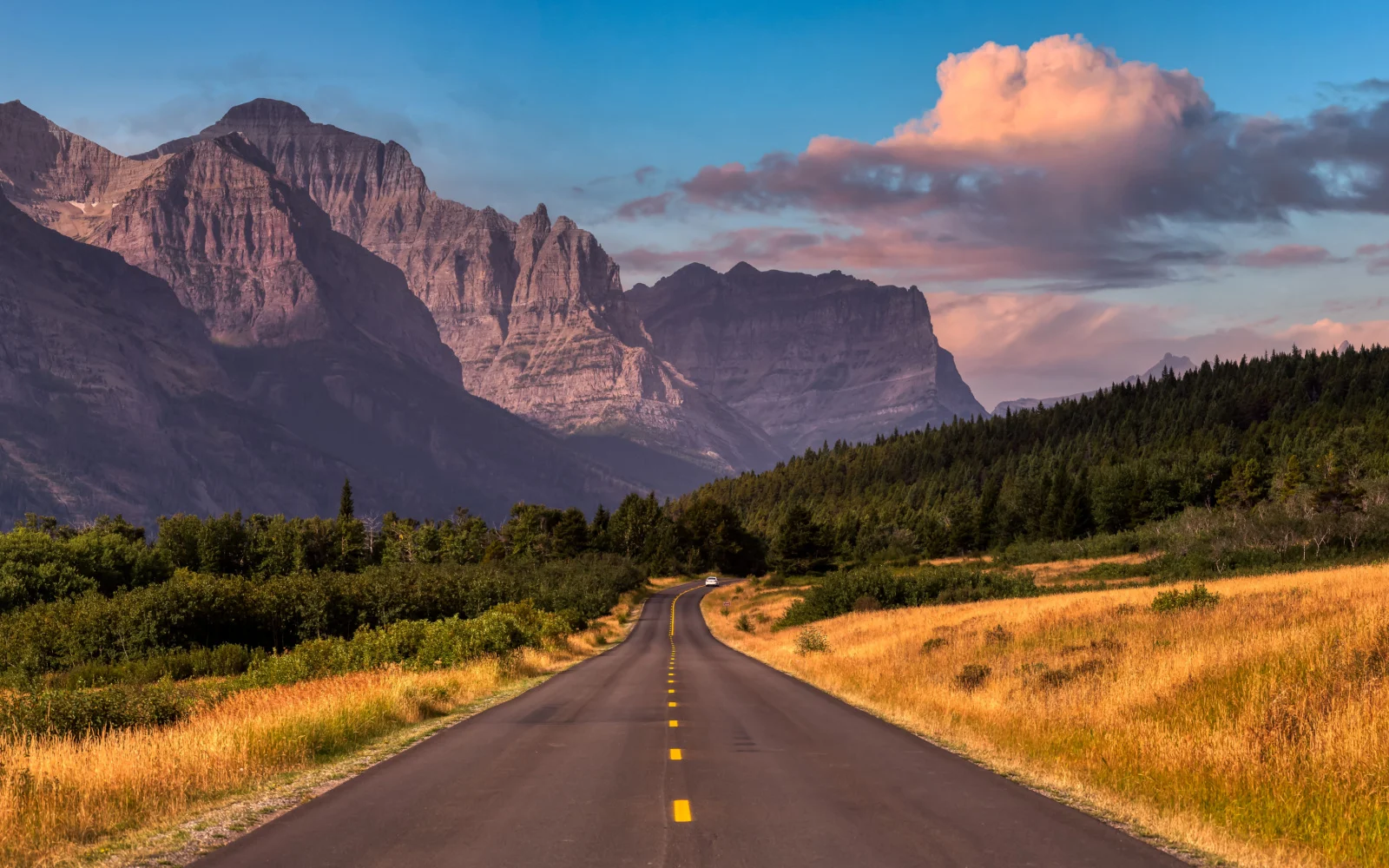What's the best time to visit Montana?
The best time to visit Montana is during the summer months, from June to September, when warm weather allows for a variety of outdoor activities and the exploration of natural attractions like Glacier National Park. This period also coincides with several popular festivals, such as the Under the Big Sky Festival and the Montana State Fair.
For skiing enthusiasts, however, winter, particularly from December to March, is ideal, with Montana’s ski towns bustling and events like the Bozeman Ice Festival and Whitefish Winter Carnival adding to the seasonal charm.
Want to live out your best Wild West dreams? Then Montana is the destination for you! No other place in the United States has such rugged landscapes and opportunities to get out into nature.
There’s a lot to do in this beautiful state, and many of the activities you’ll want to include in your trip involve spending time outdoors.
That makes timing your trip properly very important because you don’t want to be stuck inside due to bad weather! Keep reading to find out when is the best time to visit Montana.
The Overall Best Time to Visit Montana
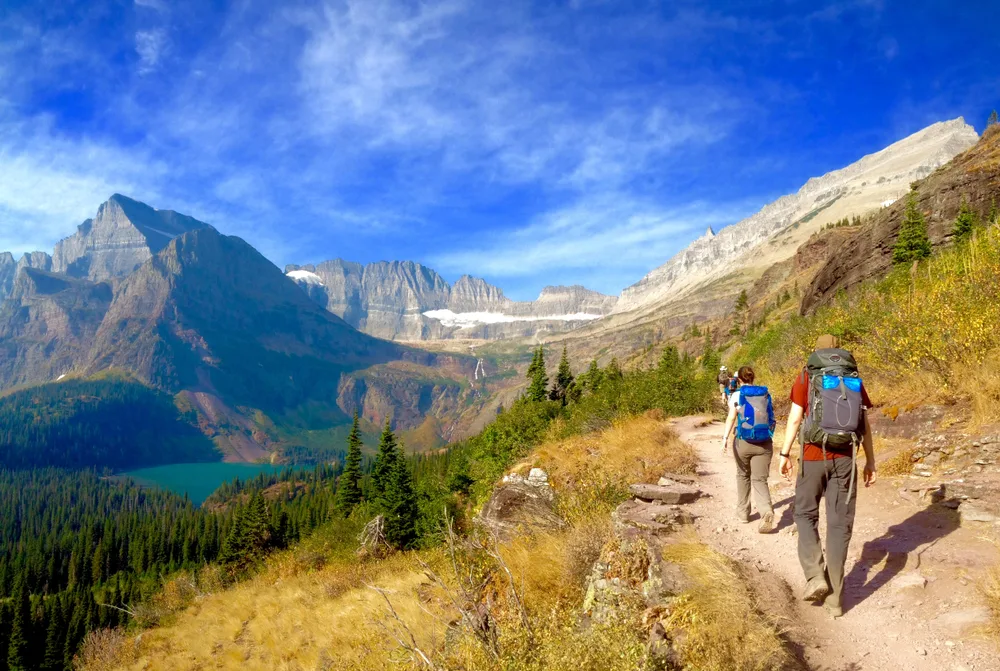
FrancesFiestaa/Shutterstock
The best time to visit Montana is in the summer, from June to September, when beautiful warm weather makes it possible to enjoy all that the state has to offer.
If you want to go skiing, then the best time to visit is the winter. The biggest factor in planning your Montana trip is the weather. The weather in the summer is warm enough to spend plenty of time outdoors — some days can even get quite hot!
High temperatures reach the high 80s in July and August, while the nights and evenings are cooler. You’ll also get to enjoy long days, usually full of sunshine, perfect for spending lots of time outdoors.
Summer is one of the best times to visit popular national parks, such as Glacier National Park. The official National Park Service website lists that all areas of the park are usually accessible by mid-June, while snow cover closes some roads for most of the rest of the year.
Hiking and backpacking trails are also more accessible in the summer. The warmer weather drives locals and residents alike outdoors, meaning that there are more festivals that you can enjoy when you visit.
Popular festivals and events during this season include:
- Under the Big Sky Festival (July)
- Big Fork Rodeo (July)
- Trout Creek Huckleberry Festival (August)
- Montana State Fair (August)
The best time to visit Montana depends a lot on the activities that you want to do. If your main goal for visiting the state is skiing or snowboarding, then the best time to visit isn’t the summer, but in winter.
Between December and March, Montana’s ski towns come alive, and people flock to the slopes for some of the best skiing in the country. According to the Big Sky Chamber of Commerce, this ski town and many others in Montana are open from Thanksgiving to mid-April.
The best months for snow coverage are usually December and January, but you can get snow throughout the season. Winter also brings plenty of festivals to Montana as people try to break up the long season with some levity.
Popular events include:
- Bozeman Ice Festival (December)
- Lewistown Montana Winter Fair (January)
- Whitefish Winter Carnival (February)
Cheapest Time to Visit Montana
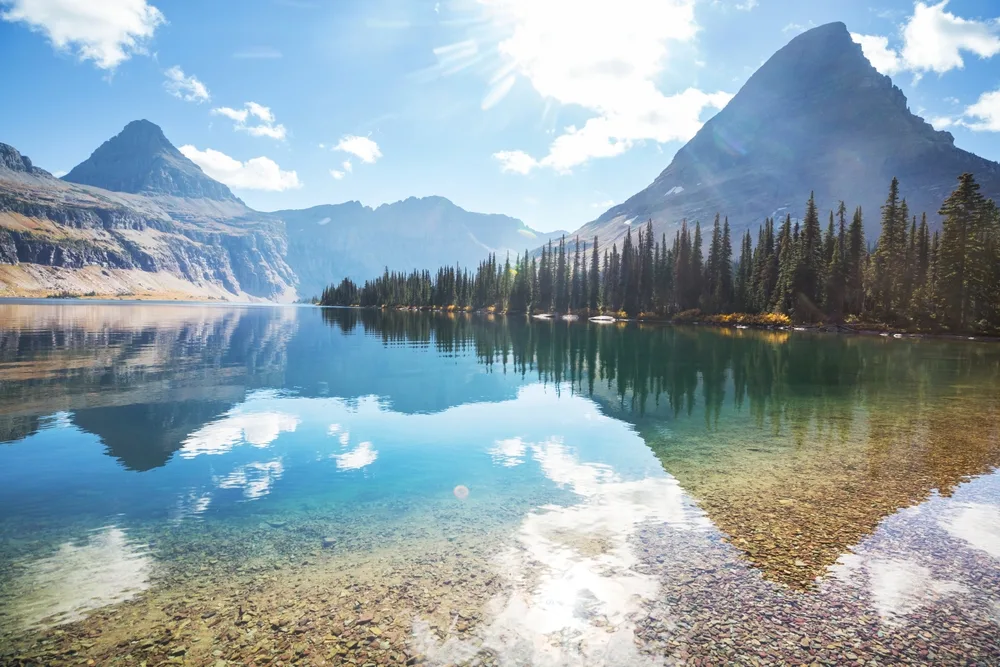
Galyna Andrushko/Shutterstock
The cheapest time to visit Montana is during one of the shoulder seasons, spring or fall, when the state gets fewer visitors and prices tend to be lower.
Spring and fall are the shoulder seasons in Montana. The weather is cooler than the summer and school breaks are over, so there are fewer people hiking.
There is sometimes still snowpack, but the peak skiing season is over as well. While some expenses, such as admission prices to national parks, are the same all year round, you can save money on others during the spring and fall.
Many hotels lower their rates during the shoulder season since they have fewer visitors. You can sometimes even get a discount on car rentals.
The least expensive month to fly to Montana is January, because that is when flights across the United States tend to offer discounts. However, accommodation can get expensive in January, especially in the ski towns.
You can also get good deals on flights in the early spring, especially if you are flexible and can fly mid-week. There are still plenty of things to do during the shoulder season. If you get lucky with the weather, you can still go on beautiful hikes.
Plus, shoulder season is better for certain outdoor activities. Fishermen prefer spring or fall because the weather is cooler, meaning that fish are more active, and water levels are higher.
Least Busy Time to Visit Montana
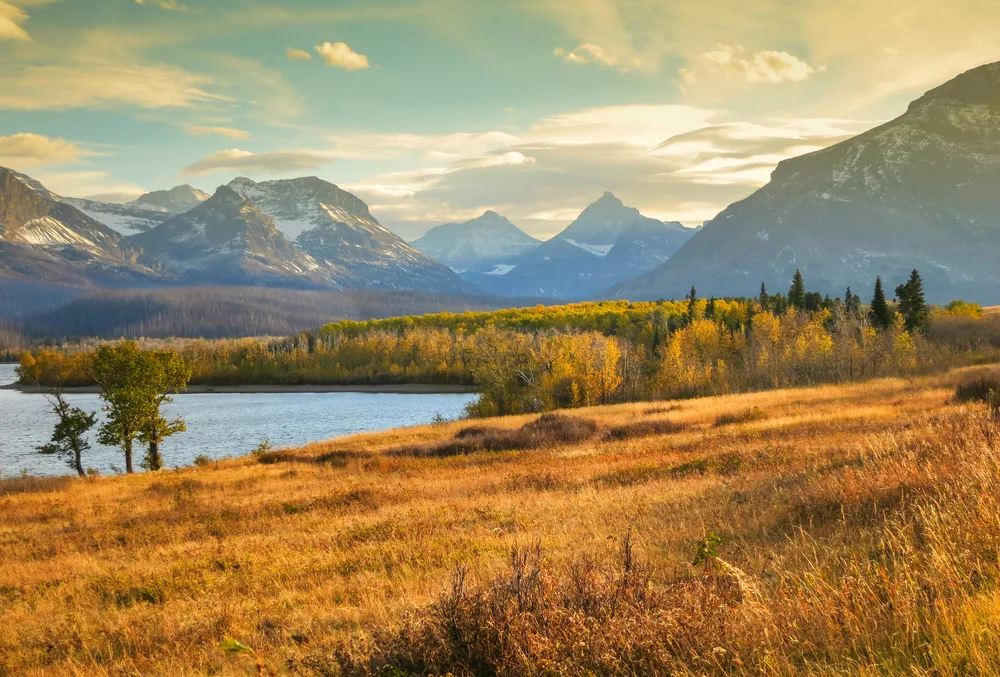
Silky/Shutterstock
The least busy time to visit Montana is during one of the shoulder seasons of spring (March-May) or fall (September-November).
Fall in particular is beautiful in Montana, and many people say that it is actually the best time to visit. The weather is warm well into September, so you can go hiking without the crowds of summer.
Locals are less harried by the busy tourist season, so you can get to know the residents better and even catch a favorite event such as Billings HarvestFest in October. The foliage is also stunning.
If you want to beat the crowds on the ski slopes, then the best months to visit are November or February, when you can beat the holiday rush. March can sometimes get busy with late season skiers or spring breakers, but February is relatively quiet, still has good snowpack, and is warmer than January.
Worst Time to Visit Montana
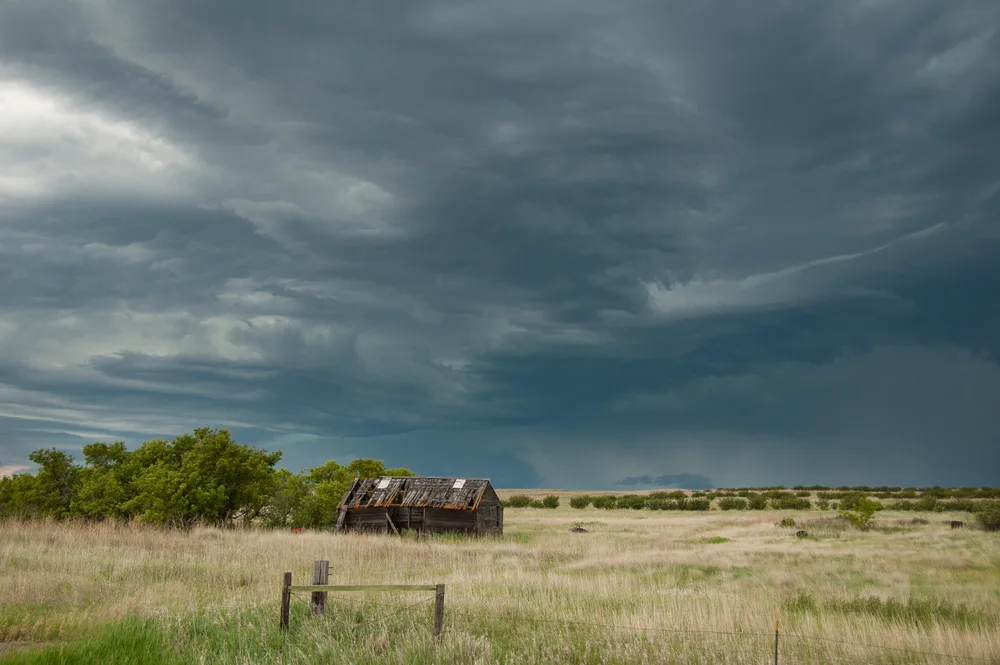
Gerald A. DeBoer/Shutterstock
The worst time to visit Montana depends a lot on your activity preferences, but most people avoid the spring because of the unpredictable weather.
Spring is one of Montana’s shoulder seasons, and a lot of popular businesses and hotels are closed during this time. Not many people visit then, usually due to the weather. Spring in Montana is informally known as “mud season.”
The weather is rainy and unpredictable, and heavy rains sometimes make roads and paths impassable, especially in the national parks. However, there are some benefits to visiting in the spring.
The rain means that the landscape is lush and blooming, and popular waterfalls and creeks are full of water. Spring is also one of the best times to spot wildlife, especially baby animals.
If you don’t like crowds, summer is the worst time to visit. Popular places such as Glacier National Park get so crowded that the National Park Service has to issue official tips for beating the crowds!
Visit in September, when the weather is still warm, but most visitors are gone. For those who don’t ski, winter is the worst time to visit.
The weather is bitterly cold, often in the teens or twenties, making it hard to explore. Although national parks such as Glacier National Park are open, many popular roads and sights are covered in snow, so only a small section of the park is open to visitors.
Montana by Month: Climate & Activities
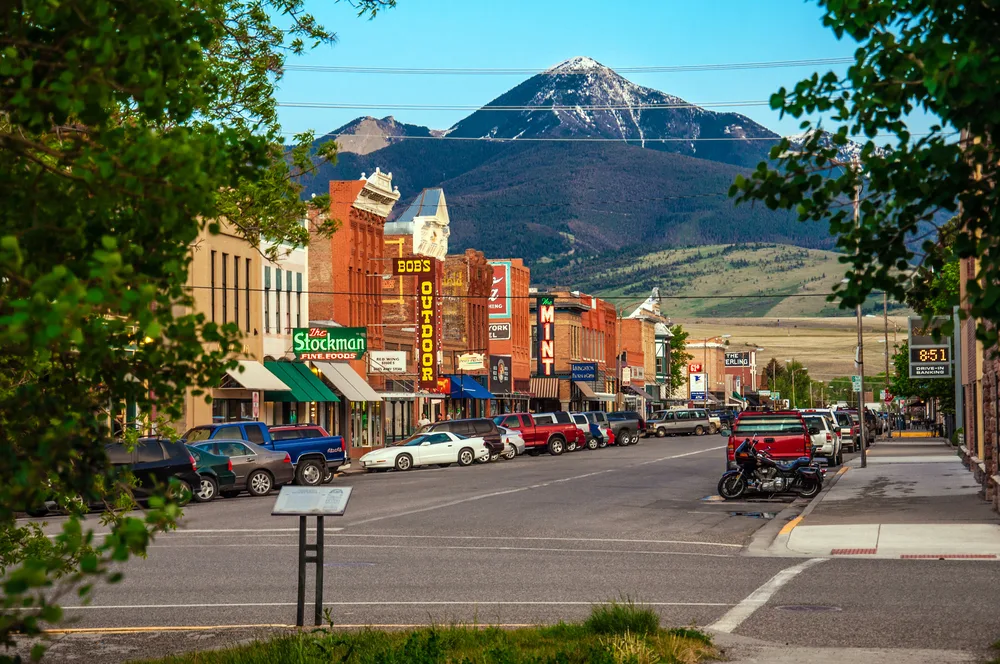
LIVINGSTON, MONTANA, USA – MAY 25, 2013 : Historic centre of Livingston near Yellowstone National Park. Even in the summer time there is snow at the hill behind the city/Nick Fox/Shutterstock
Still unsure about the best time to visit Montana? Take a look at our summary of the weather and climate by month below:
January
Winter temperatures in Montana range from -18 to -1°C (0-30°F). January is an ideal time for skiing and snowboarding in resorts like Big Sky and Whitefish, enjoying snowshoeing in Glacier National Park, and attending the Whitefish Winter Carnival.
February
Similar to January, February in Montana maintains cold temperatures. This month is perfect for dog sledding adventures, ice fishing on frozen lakes, and exploring the hot springs for a warm respite from the cold.
March
As spring begins, temperatures in Montana range from -9 to 7°C (16-45°F). March is excellent for late-season skiing, watching the migration of birds, and visiting the Lewis and Clark Caverns for a unique underground experience.
April
Spring temperatures in April range from -2 to 14°C (28-57°F). It’s a great time for fly fishing in Montana’s rivers, exploring the trails in Helena National Forest, and visiting the Museum of the Rockies in Bozeman.
May
May sees temperatures ranging from 3 to 19°C (37-66°F). Explore the beautiful landscapes in the Lolo National Forest, enjoy the vibrant birdlife during spring migration, and visit the historic ghost town of Virginia City.
June
In June, summer arrives in Montana with temperatures between 7 to 25°C (45-77°F). June is ideal for hiking in Glacier National Park, whitewater rafting on the Gallatin or Flathead River, and exploring the cultural scene in Missoula.
July
July is warm and sunny, with temperatures from 12 to 30°C (54-86°F). Celebrate Independence Day with rodeos, camping in Bitterroot National Forest, and attending the Montana Folk Festival.
August
Temperatures in August range from 10 to 29°C (50-84°F). Visit the scenic Beartooth Highway, attend the Crow Fair and Rodeo, and explore hiking trails in the Absaroka-Beartooth Wilderness.
September
As fall begins, temperatures range from 5 to 23°C (41-73°F). September offers a chance to see the fall foliage, fish on the Big Hole River, and attend the Great Northwest Oktoberfest in Whitefish.
October
October sees temperatures ranging from -1 to 18°C (30-64°F). It’s a great month for wildlife viewing in Yellowstone, exploring ghost towns like Bannack State Park, and visiting the National Bison Range.
November
Fall temperatures range from -7 to 10°C (19-50°F). November is perfect for hunting season, exploring Montana’s small towns, and enjoying the hot springs at resorts like Chico Hot Springs.
December
In December, winter returns to Montana with temperatures ranging from -12 to -1°C (10-30°F). While cold, this month brings opportunities for skiing at resorts like Bridger Bowl, enjoying winter activities in the Flathead Valley, and visiting the state’s charming Christmas markets.
Frequently Asked Questions
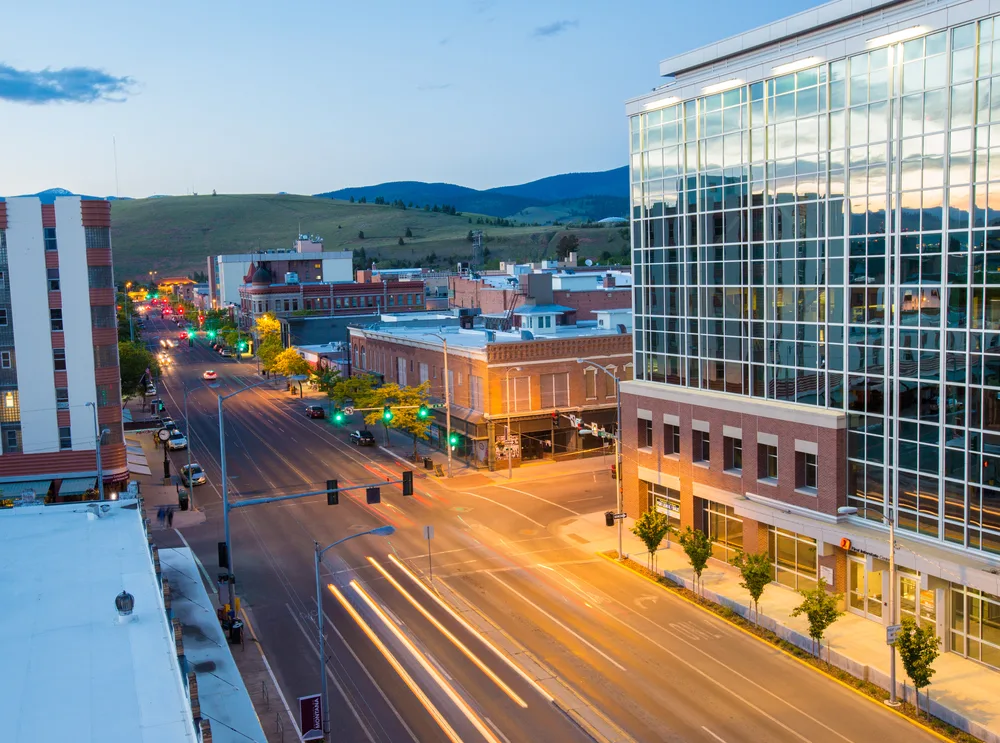
Mary Vanier/Shutterstock
These common questions about visiting Montana can also help you prepare for your trip:
What is the best month to travel to Montana?
If you want to go hiking, the best months to travel to Montana are June, July, or August. If you want to go skiing, the best months to visit are December, January, February, and March.
When is the off-season in Montana?
Spring and fall are the off-seasons in Montana. Many tourist resorts shut down completely during this time.
Is Montana better in winter or summer?
The answer depends on your preferences since the conditions are so drastically different. Winter is better for hitting the slopes, while summer is better for everything else.
So, What’s the Best Time to Visit Montana?
Montana is a destination for all seasons, so the best time to visit depends a lot on what you want to do. The best time to visit for skiing is in the winter, while summer is the best for hiking (and September is the best for hiking without the crowds).
So, with so much to see and do and plenty of amazing times to visit this storied state throughout the year, what are you waiting for — book your trip to Montana today!



